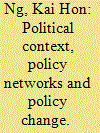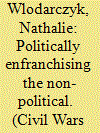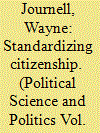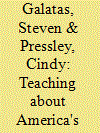|
|
|
Sort Order |
|
|
|
Items / Page
|
|
|
|
|
|
|
| Srl | Item |
| 1 |
ID:
170814


|
|
|
|
|
| Summary/Abstract |
False information, rumours and hate speech can incite violent protest and rioting during electoral periods. To counter such disinformation, United Nations peacekeeping operations (PKOs) routinely organize election-education events. While researchers tend to study how PKOs affect armed group and state behaviour, this study shifts the focus to civilians. It argues that PKOs’ election education reduces violent protest and rioting involving civilians during electoral periods via three pathways. First, learning about PKOs’ electoral security assistance during election-education events may convince people that political opponents cannot violently disturb elections, thereby mitigating fears of election violence. Second, election-education events provide politically relevant information that can strengthen political efficacy and people’s ability to make use of peaceful political channels. Finally, peace messages during election-education events can change people’s calculus about the utility and appropriateness of violent behaviour. Together, these activities mitigate fears, reduce political alienation and counter civilians’ willingness to get involved in violence. To test these expectations, I combine survey data on people’ perceptions and attitudes, events data on violent protest and rioting, and a novel dataset on local-level election-education events carried out by the PKO in Côte d’Ivoire before four elections held between 2010 and 2016. The results show that when the PKO is perceived to be an impartial arbiter, its election-education events have violence-mitigating effects at the individual and subnational levels.
|
|
|
|
|
|
|
|
|
|
|
|
|
|
|
|
| 2 |
ID:
076783


|
|
|
|
|
| Publication |
2007.
|
| Summary/Abstract |
Central to the debates on the transition of Hong Kong to Chinese sovereignty is how this process has affected change in the policy process and policy outputs. Many see policy change as a result of the evolving political environment in Hong Kong following the political transition. This article, however, adopts the notion of policy networks and argues that the analysis of policy change cannot be reduced to a simple contextual stimulus - the policy alteration model. A case study - 'the development of civic education' - demonstrates the importance of policy networks, as a particular structure of government and group relations in decision making, in explaining the course of policy change. It is apparent that the relationship between regime change and political liberalization, on the one hand, and established networks, on the other, tends to be complex and dialectical in Hong Kong. Despite the importance of sovereignty transition and political restructuring, the effect of contextual factors on public policy greatly depends on the nature of the network involved
|
|
|
|
|
|
|
|
|
|
|
|
|
|
|
|
| 3 |
ID:
089024


|
|
|
|
|
| Publication |
2009.
|
| Summary/Abstract |
This article considers the nature of the Civil Defence Forces (CDF) in Sierra Leone as a fighting force, and some of the challenges they faced for Disarmament, Demobilization and Reintegration (DDR), as well as the challenges posed by a group like the CDF to the DDR process. It considers some initiatives to educate the fighters about democracy, reconciliation and their associated responsibilities that began already during the civil war, as well as mechanisms that were created for the peaceful resolution of conflict by the CDF. Part of these initiatives have survived into the post-conflict period and continues to provide access to redress, but also a framework for political engagement. The article also considers how some of these initiatives undertaken during the war helped facilitate the transformation of the CDF into active civilian members of society, drawing some conclusions from this case for political enfranchisement more broadly.
|
|
|
|
|
|
|
|
|
|
|
|
|
|
|
|
| 4 |
ID:
096396


|
|
|
|
|
| Publication |
2010.
|
| Summary/Abstract |
The rise of state-mandated standards in public education have allowed legislators to answer the question of what constitutes a proper civic education, a debate that has existed in the United States since the turn of the twentieth century. Through the content they employ in their standards, states may indirectly influence the type of citizenship education students receive in the classroom. The present study focuses on the Virginia Standards of Learning for two courses, civics and economics and U.S. and Virginia government, which are commonly taught to eighth graders and high school seniors, respectively. A content analysis of the essential knowledge found in the standards for these courses categorizes instructional content into seven forms of citizenship: civic republicanism, character education, deliberative, social justice, participatory, transnational, and cosmopolitan. Although the results are specific to the Virginia Standards of Learning, the nature of how citizenship is portrayed within the standards may transfer to other states with similar forms of standards-based education within their social studies curricula.
|
|
|
|
|
|
|
|
|
|
|
|
|
|
|
|
| 5 |
ID:
177959


|
|
|
|
|
| Summary/Abstract |
The state plays a vital role in shaping the values and beliefs of ordinary citizens in the realm of civic education. Since the early 1980s, the significant political changes associated with decolonization and retro-cession have transformed the landscape of civic education. Differences over a shared sense of citizenship, and how this should be represented in education, have been prominent in discussions of the Hong Kong community over the years. The task of community civic education in Hong Kong largely rests with the Home Affairs Bureau and its advisory body, CPCE—a committee established in 1986 for advices and implementing activities outside schools in conjunction with the Government and concerned community organizations. However, the Government has attempted to manipulate and steer the Committee’s work through its terms of reference, its organizational restructuring, its activities, its funding support, and the appointment of members. As a result, the Committee has been constrained by its composition, powers, and functions, and these have impaired its role as an advocate for civic education. This article ends with a discussion of the conditions, constraints, and strategies of the state in exercising hegemony.
|
|
|
|
|
|
|
|
|
|
|
|
|
|
|
|
| 6 |
ID:
096390


|
|
|
|
|
| Publication |
2010.
|
| Summary/Abstract |
Civic engagement is increasingly recognized as a significant function of public universities. The university provides a variety of opportunities for civic engagement, including co-curricular activities, service learning opportunities, and specific majors and minors. This article reviews the attempt to embed civic engagement and civic education about the national debt and budget deficit issues in a university core curriculum course at Stephen F. Austin State University. We focus on specific issues of curriculum instruction and assessment of student learning of knowledge regarding the debt and deficit issues.
|
|
|
|
|
|
|
|
|
|
|
|
|
|
|
|
|
|
|
|
|